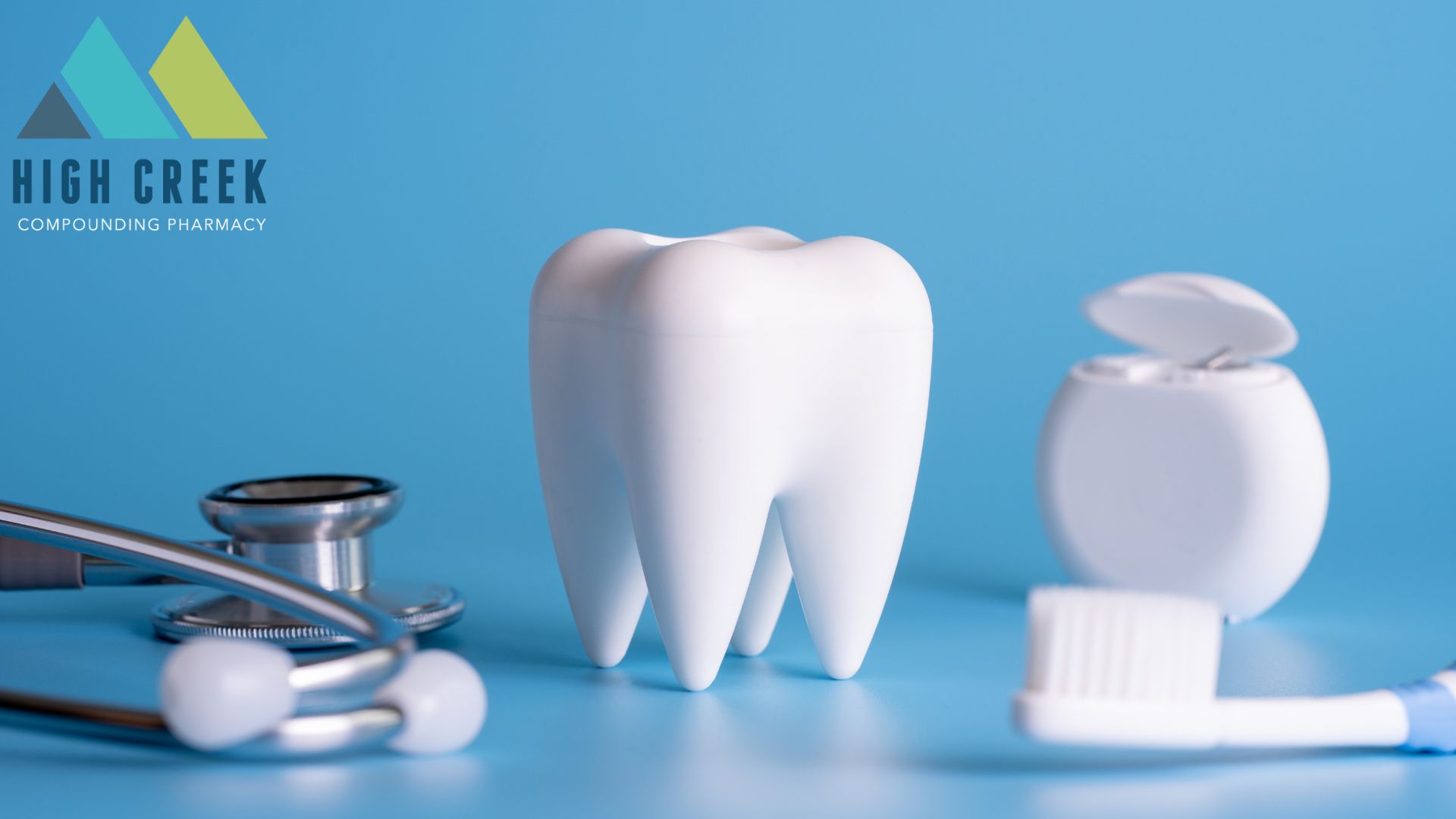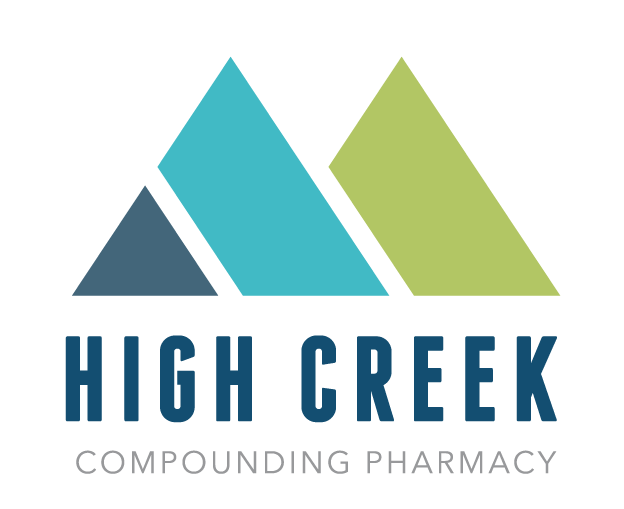
04 Jul Dental Compounds: Personalized Medications for Oral Health from a Compounding Pharmacy
Maintaining good oral health is crucial for overall well-being, and dental compounds have revolutionized the field of personalized medications for oral care. Compounding pharmacies in Richmond, UT, offer a range of dental combinations tailored to meet individual needs. These specialized formulations have proven highly effective in addressing various dental concerns, promoting oral health, and enhancing patient outcomes. This blog post will explore the world of dental compounds and how they transform oral healthcare.
Understanding Dental Compounds
Dental compounds are specialized medications formulated by compounding pharmacists specifically for dental purposes. These compounds are created by combining various active ingredients, such as antibiotics, analgesics, anti-inflammatory agents, anesthetics, and other components that target specific oral health conditions. The unique advantage of dental compounds is that they can be customized to meet patients’ individual needs, allowing for tailored solutions for a wide range of dental issues. This personalized approach to medication enables compounding pharmacies to play a vital role in providing effective and efficient dental care. By working closely with dentists and patients, compounding pharmacists can create medicines that address the specific requirements of each patient, ensuring optimal treatment outcomes. Whether it’s a specialized antibiotic mouthwash or a custom-compounded pain relief gel, dental compounds offer a versatile and patient-centric approach to oral healthcare.

Advantages of Dental Compounds
Dental compounds from a compounding pharmacy offer several advantages for oral health care in Richmond, UT. Here are some key benefits of dental compounds:
- Personalized Medications: Dental compounds allow for the customization of medications to meet each patient’s unique needs. Compounding pharmacists can tailor dental medicines’ dosage form, strength, and flavor to suit individual preferences and requirements. This personalized approach ensures that patients receive the most effective and suitable medications for their oral health conditions.
- Enhanced Medication Compliance: Dental compounds can improve medication compliance among patients. Compounding pharmacists can create drugs in various forms, such as gels, pastes, mouthwashes, or lozenges, which may be easier to use and more comfortable for patients. By addressing individual preferences and needs, dental compounds can promote better adherence to medication regimens, leading to improved oral health outcomes.
- Allergy and Sensitivity Considerations: Some patients may have allergies or sensitivities to certain ingredients commonly found in commercially available dental medications. With compounding, pharmacists can exclude allergens or irritants from formulations and create hypoallergenic alternatives. This allows individuals with specific sensitivities to receive customized dental medications without the risk of adverse reactions.
- Treatment of Specific Conditions: Dental compounds can be beneficial for treating particular oral health conditions that may require specialized medications. For example, patients with periodontal disease or oral thrush may benefit from compounded antimicrobial mouthwashes or topical medications formulated to target the underlying infection. Compounding allows for the precise combination of active ingredients and strengths necessary for effective treatment.
- Pediatric Dentistry: Children may have difficulty taking traditional dental medications due to taste aversion or the inability to swallow pills or tablets. Compounding pharmacists can create pediatric-friendly formulations with pleasant flavors and appropriate dosages to make medication administration more accessible and enjoyable for young patients. This can encourage compliance and ensure an effective treatment in pediatric dentistry.
- Preservative-Free Options: Some individuals may be sensitive to preservatives commonly found in commercially available dental medications. Compounding allows for creating preservative-free formulations, reducing the risk of adverse reactions and accommodating the needs of patients with sensitivities.
Common Dental Conditions Addressed by Compounded Medications
Compounded medications are customized prescriptions prepared by compounding pharmacies to meet the specific needs of individual patients. Dentists may prescribe compounded medicines for various dental conditions, including:
- Temporomandibular Joint (TMJ) Disorders: Compounded medications, such as topical gels or creams, can be formulated to provide localized pain relief and reduce inflammation associated with TMJ disorders.
- Oral Ulcers and Lesions: Compounded mouthwashes or gels may alleviate discomfort, reduce inflammation, and promote healing in oral ulcers, canker sores, or other oral lesions.
- Dry Mouth (Xerostomia): Saliva substitutes or oral sprays can be compounded to help relieve the symptoms of dry mouth. This condition may result from certain medications or underlying health conditions.
- Tooth Sensitivity: Compounded toothpaste or gels containing desensitizing agents, such as potassium nitrate or fluoride, can be prescribed to alleviate tooth sensitivity caused by exposed dentin or enamel erosion.
- Oral Thrush (Candidiasis): Antifungal medications, such as nystatin or clotrimazole, can be compounded into oral suspensions or tablets to treat oral thrush, a fungal infection characterized by white patches in the mouth.
- Periodontal Disease: Compounded antimicrobial gels or rinses containing antibiotics like metronidazole or minocycline may be prescribed as adjunctive therapy for periodontal disease to reduce bacterial growth and inflammation.
- Gingivitis: Compounded oral rinses or gels containing anti-inflammatory agents, such as chlorhexidine or steroids, can help manage the symptoms of gingivitis, a mild form of gum disease characterized by gum inflammation and bleeding.
- Oral Pain: Compounded topical gels, ointments, or patches can be formulated with analgesic medications like lidocaine or benzocaine to relieve localized pain following dental procedures or for conditions like oral mucositis.
The Process of Compounding Dental Medications
Compounding dental medications involves the preparation of customized medications tailored to meet the specific needs of dental patients. Specialized compounding pharmacies often prepare these medications by prescriptions provided by dentists.
- Prescription and Patient Evaluation: The dentist evaluates the patient’s dental condition and determines the need for a compounded medication. If a customized remedy is deemed necessary, the dentist writes a prescription specifying the required medication, dosage, and additional instructions.
- Compounding Pharmacy Selection: The dentist may recommend or refer the patient to a compounding pharmacy in Richmond, UT, specializing in dental compounding. The pharmacy should have the equipment, facilities, and expertise to prepare the medications accurately.
- Consultation with the Compounding Pharmacist: The patient may consult a compounding pharmacist once the prescription reaches the compounding pharmacy. The pharmacist will review the drug, discuss the patient’s needs, allergies, and preferences, and address any concerns or questions.
- Medication Formulation: Based on the prescription and patient consultation, the compounding pharmacist will determine the appropriate ingredients and formulations for the medication. Depending on the specific requirements, dental medicines can be prepared in various forms, such as gels, creams, ointments, mouth rinses, tablets, or capsules.
- Compounding Process: The compounding pharmacist follows strict guidelines and standards to prepare the medication. They may use specialized equipment, such as mortar and pestle, to combine the necessary ingredients. The compounding process ensures that the drug is accurately measured, mixed, and compounded to meet the specific dosage and formulation requirements.
- Quality Assurance: Compounding pharmacies adhere to quality assurance practices to ensure compounded dental medications’ safety, efficacy, and stability. This includes testing the final product for potency, purity, and sterility and complying with relevant regulations and guidelines.
- Packaging and Labeling: Once the compounded medication is prepared, and quality checked, it is packaged appropriately. The packaging may include detailed labeling with the patient’s name, the medication name, dosage instructions, and additional warnings or precautions.
- Dispensing and Patient Education: The compounded dental medication is dispensed to the patient along with comprehensive instructions for use. The pharmacist may educate patients about proper administration, storage, and potential side effects. They may also address any questions or concerns the patient may have.
Collaboration Between Dentists and Compounding Pharmacists
The collaboration between dentists and compounding pharmacists is crucial in delivering optimal patient outcomes. Dentists play a key role in assessing each patient’s specific needs and devising personalized treatment plans. By collaborating with compounding pharmacists, they can develop customized dental compounds specially formulated to cater to the unique requirements of individual patients. This collaborative approach enhances the effectiveness of treatment regimens and improves patient satisfaction by offering tailored solutions for their dental health needs. It enables dentists to provide individualized care that addresses each patient’s specific concerns and challenges, resulting in improved oral health. This partnership between dentists and compounding pharmacists ensures that patients receive the highest quality of care and achieve optimal oral health outcomes.

Choosing a Reliable Compounding Pharmacy in Richmond, UT
Selecting a reputable compounding pharmacy in Richmond, UT, is crucial when seeking dental compounds. Consider the following factors:
- Experience and Expertise: Look for a compounding pharmacy with extensive experience in dental compounding and a team of skilled pharmacists who understand the complexities of oral health.
- Quality Assurance: Ensure the compounding pharmacy follows stringent quality control measures and meets industry standards. Look for registered, licensed, and regularly inspected pharmacies by regulatory bodies.
- Personalized Service: A reliable compounding pharmacy will prioritize customized patient care, offer consultation services, understand individual needs, and provide ongoing support throughout the treatment process.
- Timely Delivery: Choose a compounding pharmacy that can deliver dental compounds promptly, ensuring patients receive their medications on time without any delays.
Conclusion
In conclusion, the availability of dental compounds from a compounding pharmacy like High Creek Pharmacy in Richmond, UT, is a game-changer for personalized oral health care. With their expertise in creating customized medications, patients can receive tailored solutions to address their dental needs. High Creek Pharmacy delivers exceptional results, whether it’s a unique formulation for tooth sensitivity, gum disease treatment, or a specialized mouthwash. By contacting them, individuals can take advantage of their innovative approach to oral health and benefit from the personalized care they provide. Embrace the power of dental compounds and unlock a new level of oral health today by contacting High Creek Pharmacy in Richmond, UT.

No Comments